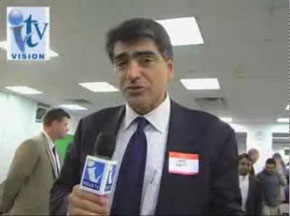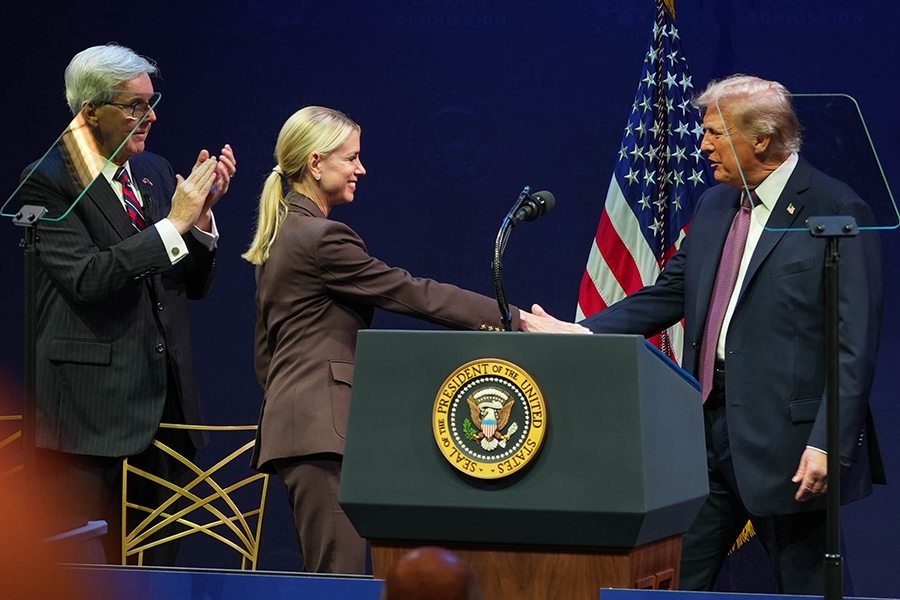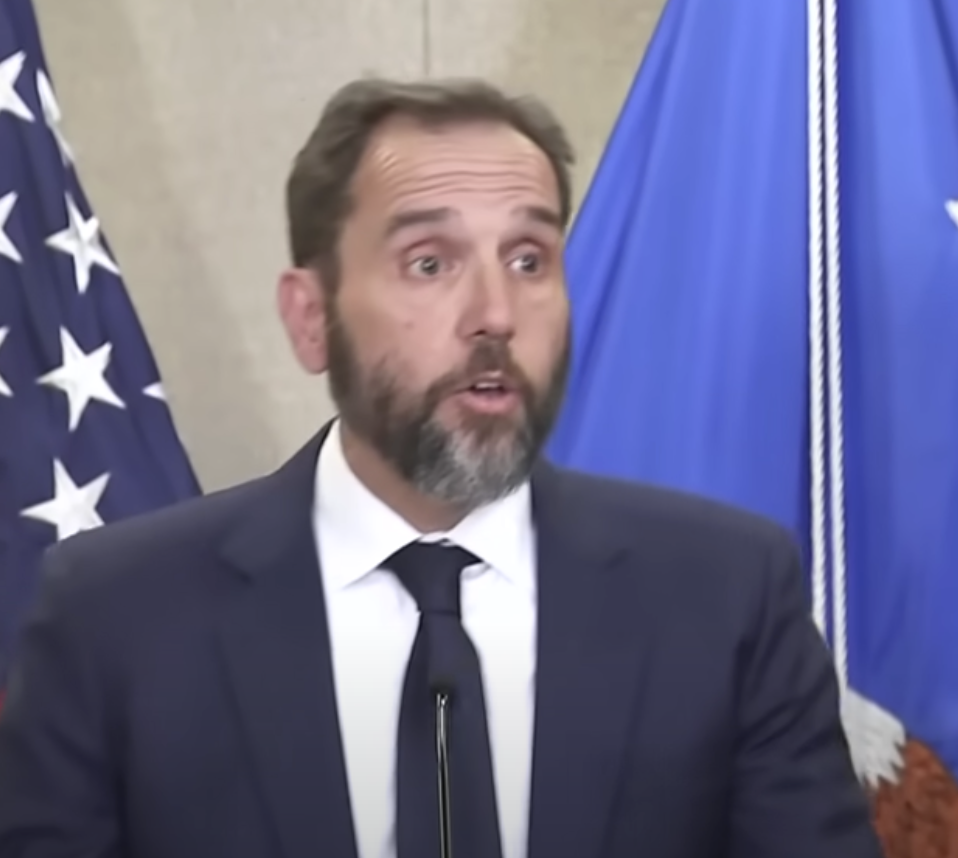
WASHINGTON – As Mark T. Rossini sat at the defendant’s table in the D.C. federal courthouse in May awaiting his fate, you couldn’t help but wonder, if only for a moment, if he saw himself as a tragic figure in a fabled Hollywood film:
Dapper, veteran FBI agent romances pretty actress and foolishly risks career and prestige — not to mention a $140,000-a-year job — to sneak the actress a secret FBI document.
And you couldn’t help but wonder if he remembered the words he uttered to a group of Muslims at the Al Badr Mosque in Brooklyn that was captured on a YouTube video dated Oct. 20, 2008:
“We are all equal. None of us is above the law, none of us is under the law.”
In the end, Rossini got a slap on the wrist: one year of probation and a $5,000 fine for digging into confidential FBI records and then lying about it to his supervisor and federal investigators.
It didn’t much matter that he did it for his love interest –actress Linda
The slap on the wrist may have been relatively painless. But his fall from grace was not. Loss of job. Loss of colleagues. Excommunication from the
FBI, an institution obsessed with public image. Rossini, who turned 48 last month, was suddenly very bad for the FBI’s public image. He was unceremoniously kicked to the curb.
“He’s still reeling from the mistakes he made,” a friend said. “He’s devastated. Mark was a hard-working agent who put the needs of the FBI and country at the forefront for years and has made many sacrifices. He’s made some mistakes.”
For a Rossini, a guy who had lived a charmed life — gallivanting about New
York and Washington with girlfriend/ actress Linda Fiorentino, eating
steak, sipping fine Cabernet, running with some of the big dogs at the FBI, it was a precipitous and ugly fall, and yes shocking to some.
“I was speechless,” recalled Michael Rolince, a former FBI counter-terrorism
honcho who is now in the private sector, when first hearing of the charges.
“The more I learned about it the more dumbfounded I was. That you would risk your career, your pension, your reputation. There’s nothing worth risking your reputation and integrity.”
The rise and fall of FBI agent Mark Rossini is a story worth telling and
perhaps, one worthy of a movie. Unquestionably, it would have been
far worse, and far more disturbing had he committed the crime for money.
But for love? Well, it seemed a little less egregious. After all, who hasn’t at one time or another been made a fool of by love?
In the end, part of Rossini’s plea agreement was that he’d give up his FBI
job and find another one. He headed south to New Orleans to work for the
Youth Rescue Initiative that was run by Jim Bernazzani, a former special agent in charge of the New Orleans FBI office. And reportedly he split up with Fiorentino, who was never charged in the case.
He also created his own risk management consulting company MTR Associates, and formed an affiliation with The Repton Group of N.Y., a security and crisis management firm. It’s unclear how active he’s been with these enterprises.
Rossini and his Washington attorney, Adam S. Hoffinger, a former N.Y. federal prosecutor, declined comment for this report. Attempts to reach Fiorentino were unsuccessful. She did not return calls after messages were left on a voice mail.
Rossini joined the FBI in July 1991 working for six years in a white-collar crime unit before joining the Joint Terrorism Task Force. In New York, he became tight with John O’Neill, a bigger-than-life personality who led the division’s counter-terrorism unit.
Interestingly, as a side note, O’Neill kept warning every one of the dangers of Osama bin Laden — pre-9/11. Ironically, on Sept. 11, 2001, his dire predictions came true: He was working as the security director for the World Trade Center and died in the attack.
Back in 1999, O’Neill was concerned that the CIA was not sharing information. There was clearly tension between the FBI and CIA. So O’Neill sent Rossini to D.C. on a mission: to become the New York FBI’s Joint Terrorism Task Force representative to the CIA’s Counterterrorist Center. That way, hopefully, more information would flow between the two agencies.
But not everyone embraced Rossini with unbridled love. There were some within CIA who thought of him as “John O’Neill’s spy”, said ex-FBI agent Rolince.
Socially, Rolince said Rossini “loved being out with the crowd. He was
really a fun person to be around. Very engaging, very social, kind words for
everybody. I didn’t see him as being egotistical, and all about himself.”
“Mark was good looking, carefree and single,” Rolince said. “I think he liked the power base of Washington and the nightlife of New York.”
In Washington, he often went to Les Halles, a popular French restaurant and bar near FBI headquarters frequented by agents. On weekends, he often headed up to New York.
On April 14, 2001, during his stint in D.C., Rossini married Amelia Stewart,
a program director for the Children’s Defense Fund in Washington. Before
that, Stewart had worked for the federal government during the Clinton
years, but lost her job when George W. Bush became president, divorce
papers in D.C. Superior Court show. Then beginning in 2002, “she worked
intermittently in a number of jobs.”
The marriage traveled down a bumpy path, according to divorce papers and a friend. His wife, Amelia Stewart Rossini suffered a series of health
setbacks including recurring bouts of cancer and two miscarriages, the court papers showed. It took its toll.
“The strain placed on the marriage by this cascade of health crises is
difficult to imagine, and also difficult to overestimate,” said a court
order issued by Superior Court Judge John M. Campbell. “The defendant (wife) testified that the effect on her caused the collapse of the marriage. … This was made worse by the requirements of the plaintiff’s job, which demanded frequent travel during this time.”
In the end, in April 2008, the judge ordered Rossini , who was earning $140,000 a year, to pay $1,500 a month in alimony for 24 months from the date of sale of their marital home. The records noted he was already paying $700 per month child support for his 16-year-old son from a previous marriage.
The couple officially separated around September 2006. By then Rossini had changed jobs; he was special assistant to the assistant director of public affairs at headquarters in Washington, where he seemed to fit in well.
“He was a smart stand up guy,” said Newsweek investigative reporter Michael Isikoff. “He knew the bureau and he knew the press. He was the real deal. He had been on the front line of the war on terrorism and that gave him added credibility.”
But in the personal ledger, even before he separated and filed for divorce, the marriage appeared over.
“He was emotionally out of the marriage by the time I got there. He was
virtually separated,” said Jeff Stein, Congressional Quarterly’s national security editor. Stein met Rossini in late 2005 when he began work on an in-depth piece on the FBI’s transformation to an intelligence gathering agency.
While working on the article, Rossini was one of Stein’s key contacts in the FBI press office.
“He was really struggling,” said Stein, who writes the lively Spy Talk
blog for Congressional Quarterly. “His wife wouldn’t give him a divorce.
She had the house. It was a mess.”
In February 2006, Rossini got a big break — in his personal life that
is. According to the newspapers, he met the raven haired, smokey voiced actress Linda Fiorentino, three years his senior, at Elaine’s restaurant on 2nd Avenue on New York’s Upper East Side, a fixture that over the years had served drinks, dinners and after-theater noshes to such luminaries as Woody Allen, Michael Caine and Jackie O.
“Almost overnight, the two became inseparable, popping up together at
Elaine’s, Bruno’s and Rossini’s D.C. hangout, Les Halles,” according to a Dec.
5, 2008, New York Post article. He beamed when he was around her.
A friend said he wasn’t seeking publicity. He just enjoyed her company.
“Linda is a nice lady,” the friend said. “They got along well. That’s what he was
looking for, not the press associated with it.”
But Stein said Rossini seemed to enjoy the added cache that came with dating an actress.
“I think he was like a moth to a flame,” Stein said. “He was totally enthralled with her.
She was movie star, not only a movie star, but she did crime movies.”
Some of those movies included: “Men In Black,” “The Last Seduction,” “Vision
Quest” and “Liberty Stands Still.”
Rossini was proud of Fiorentino.
Stein said one day Rossini brought Fiorentino to his home in Georgetown.
Rossini called and said: “I’m bringing somebody by. Get dressed, really
presentable,” Stein recalled.
He said they showed up and Rossini introduced Fiorentino.
“I didn’t know her, she looked familiar,” Stein said.
Stein said they all headed out for breakfast and started walking down 30th
Street in Georgetown when Stein turned to Fiorentino and said: “You look
familiar.”
“Men in Black?” she responded with a smile.
The two made a good couple, Stein said.
“They could finish off each other’s sentences as they say,” he remarked. “She
was really nice.”
Meanwhile, according to news reports, Fiorentino had a fascination with Anthony Pellicano, even before she met Rossini in 2006. Pellicano was under investigation for illegally wiretapping Hollywood’s Who’s Who at the behest of clients including comic Chris Rock. And he was accused of illegally wiretapping such folks as Sylvester Stallone.
Pellicano was indicted in 2006 on illegal wiretap charges. He was convicted in 2008. But that was not his first brush with the law.
In 2005, he was serving 2 ½ years in prison for illegal possession of a hand
grenade and plastic explosives.
It was during that time that Vanity Fair contributor John Connolly recalled
meeting with Fiorentino, who asked him to arrange a meeting with Pellicano’s wife, Kat, according to a New York Post report. She was interested in making a movie on Pellicano, the paper reported.
The paper said Fiorentino tried giving Kat the hard sell for rights to production of her husband’s story. But Kat Pellicano declined.
The exact nature of Fiorentino and Anthony Pellicano’s relationship has
never been made clear. Government documents describe her as having “had a previous relationship” with Pellicano. Other news reports said that
Fiorentino got to know Pellicano while campaigning for a good cause — autism. Pellicano’s son is autistic.
In the end, it came down to this: Fiorentino was helping Pellicano. Rossini
was helping Fiorentino by digging through secret FBI documents.
“He did it for love,” Stein said.
Added Dan Moldea, a noted author who has been working on a book for years on the Anthony Pellicano case, and has met Rossini and Fiorentino: “I don’t know them well, but they’re nice people. But I can tell you this about the Pellicano case, I can’t think of anyone connected to this entire situation who has come out of this in one piece, not one person.”
Rossini’s walk on the criminal side began in January 2007 and continued through July. According to government documents, he made more than 40 illegal searches on the FBI’s Automated Case Support System (ACS), which contains confidential reports on previous and current cases,” according to prosecutors’ court documents.
In some cases, he “downloaded or printed FBI reports related to witnesses,
confidential sources and the progress of several criminal investigations and
ongoing prosecutions,” the documents said.
“None of the defendant’s searches were part of his assigned work,” the
government wrote.
“In some cases, the defendant also downloaded or printed FBI reports related to witnesses, confidential sources, and the progress of several criminal investigations and ongoing prosecutions.”
Most of the searches involved the Pellicano case.
The search that did him in involved an FBI confidential report about the
Pellicano case that was downloaded Jan. 26, 2007. That report was passed
on to Fiorentino (referred to in the document as “X”) who provided a copy to “an attorney for Anthony Pellicano in San Francisco, California.”
The Pellicano attorneys in turn accused the government of misconduct for
withholding exculpatory evidence that could have helped the defense.
Little did the defense know that the judge had ruled previously, ex-parte (outside the presence of the defense team), that the government did not have to share the report. Pellicano was convicted in two trials in 2008 of 78 charges and sentenced to 15 years in prison and a federal investigation was underway to find out about the leaked document.
On Oct. 27, 2008, a little more than a month before Rossini allegations surfaced in a criminal court filing, the blog Radaronline reported this:
“Is aging sex bomb Linda Fiorentino getting real life mixed up with a spy
movie? The star of ‘The Last Seduction’ and ‘Jade’ is dating an FBI agent and,
say sources, taking more than a passing interest in his work. The agent,
counterterrorism specialist Mark Rossini, recently transferred from
Washington, D.C., to New York, partly, according to one source, to be closer
to Fiorentino, with whom he’s often seen dining at Elaine’s, the uptown
restaurant favored by the literary crowd.
“Here’s where it gets weird: Rossini has apparently been accepting-or
soliciting-Fiorentino’s help with criminal investigations, including the one
against jailed private investigator Anthony Pellicano. “He’s a big gossip,”
says one source. “He talks about all the help she’s been giving him on
cases.”
The government’s sentencing report said Rossini lied to his supervisors about news coverage linking him to the Pellicano case and said it was completely false.
On Feb. 25, 2008, he lied to agents from the Department of Justice Office of
Inspector General by denying that he obtained the information “without
authorization or that he provided any FBI information” to Fiorentino, according to the sentencing memorandum.
This past May 14, Rossini stood in court before U.S. Magistrate Judge John Facciola. He had pleaded guilty to five misdemeanor counts of illegally accessing FBI computers for personal use. He had already given up his job. He looked tense. He scanned the gallery.
The government was asking for five years’ probation and a $10,000 fine. Faciolla told Rossini how difficult it was to be sentencing a law enforcement guy. Faciolla mentioned that he had been a former federal prosecutor himself and that he, just like Rossini, hailed from from New York and that over the years he had come to admire a number of people in law enforcement.
Then Fociolla remarked that this is “not easy for me to do.”
Hoffinger told the judge that his client was remorseful and had paid the price for losing a job “he took great pride in.”
He said Rossini had been subjected to “public and private shame” but was “a victim of his own actions.”
Then before being sentenced to a year’s probation and a $5,000 fine, Rossini told the judge: “I am so profoundly and deeply ashamed and remorseful.”
In end, the downfall of FBI agent Mark Rossini saddened many friends including Congressional Quarterly’s Stein.
“He loved being an FBI agent, he loved it. He loved the perks of it.”
Unfortunately, sometimes love can be very costly.
httpv://www.youtube.com/watch?v=GNY42PfELOU





2 thoughts on “The Raven Haired Actress and the Fall of a Dapper FBI Agent”